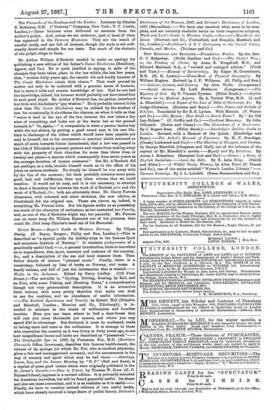Mr. Arthur William A'Beckett needed to make no apology for
publishing a new edition of his father's Comic Blackstone (Bradbury, Agnew, and Co.) He is quite justified in saying, in spite of the changes that have taken place in the law within the last few years, that, " written forty years ago, the caustic wit and kindly humour of The Comic Blackstone retain their charm." That work proved its author not only to be endowed with a genuine sense of humour, but to have a wide and minute knowledge of law. Had he not bad the knowledge, indeed, his humour would probably not have stood him in such good stead. Mr. Arthur A'Beckett has, we gather, interfered but little with his father's "gay wisdom." He is probably correct in his view that The Comic Blackstone may be utilised by the student of law, for occasionally it elucidates( the obscure, as when it tells us that "water is land in the eye of the law, because the law takes a dry view of everything, and looks not at the water bat at the ground beneath it," Or, again,—" A composition is when a parson makes hay while the eon shines, by getting a good round sum in his own life- time in discharge of the tithes which would have been payable not only to himself, but to his successors—a practice which savoured so much of eosin towards future incumbents, that a law was passed in the 13th of Elizabeth to prevent parsons and vicars from making away with the property of their churches for more than three lives, or twenty-one yeare—a statute which consequently fires seven years as the average duration of human existence." But Mr. A'Beckett did not perhaps, as a rule, trouble himself much as to the effect of his jokes on serious students. He simply let himself be run away with by the fun of the moment; his book probably contains more pans, good, bad, and indifferent, than any other volume that we could mention. It would not be easy, and it is not necessary, to attempt to draw a boundary-line between the work of A'Beckett ;Are and the work of A'Beckett fits; both are admirably done. Mr. Harry Fonda illustrates, with coloured and other aketchea, the new edition, as Crnikshank did the original one. These are clever, as, indeed, is everything Mr. Furniss tries. But his figures strike us as possessing too much of the character of caricature, as too contorted, too Punchy, and, as one of the A'Becketts might say, too paunchy. Mr. Farniss can no more keep Sir William Harcourt out of his pictures, than could Mr. Dick keep Charles's head out of his Memorial.


































 Previous page
Previous page